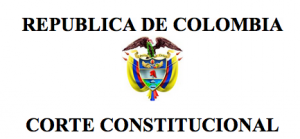In recognition of the work that Colombian activists are doing on digital rights the magistrate in charge of one of the Constitutional procedures against Law 1520, also known as Ley Lleras 2.0, requested concepts to different institutions.
Fundación Karisma and Fundación para la Libertad de Prensa (FLIP) joined efforts to present a common concept that was also supported by Constitutional Law proffesor Luis Manuel Castro from Universidad del Rosario and RedPaTodos (an Internet network of cybercytizens that was also called by the Court despite the fact that it has no juridical form). This “amicus curiae” supported the arguments under exam by the Constitutional Court presented by Senator Jorge Robledo and turns to be probably the first bridge action among human rights and digital rights institutions with new network forms of citizen participation.
Law 1520 of 2012 was the result of a fast track procedure that ignored the civil society claim for debate
The new law was the last requirement to start the US-Colombia FTA changing the Colombian copyright law in many ways except for the notice and takedown procedure that was discussed in failed draft during 2011 under the Ley Lleras tag, both the form and the substance of the draft that lead to Law 1520 or “Ley Lleras 2.0” was discussed by many, in Colombia, by world academics and civil rights defenders.

